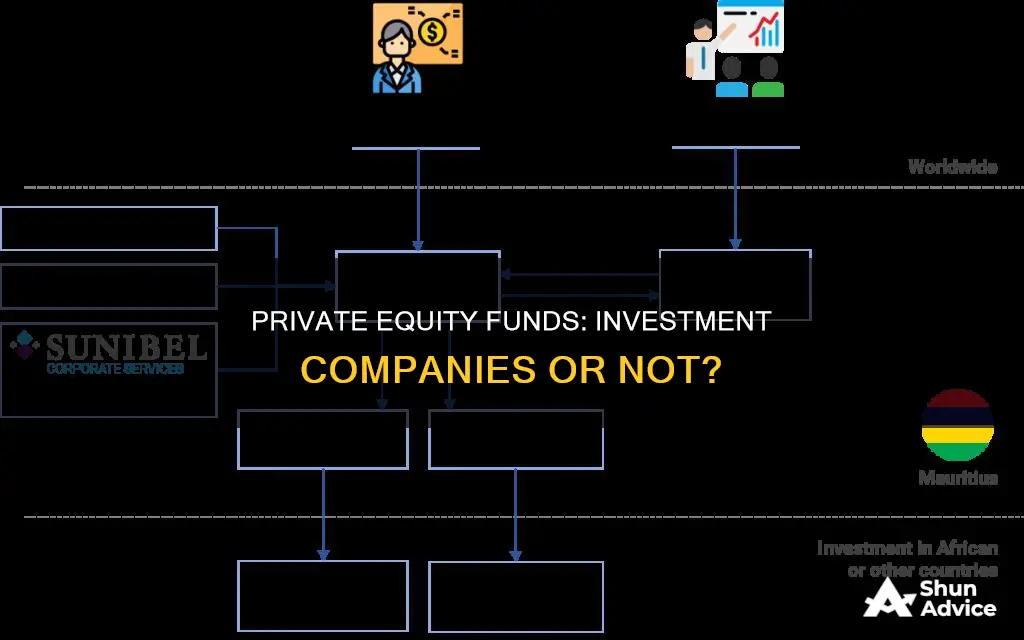
Private equity funds are a form of investment that takes place outside of the public stock market. They are managed by private equity firms, which are investment management companies that provide financial backing to private companies. Private equity funds are a pooled investment vehicle, where the adviser pools together money from investors to make investments on behalf of the fund.
Private equity funds are typically only open to accredited investors and qualified clients, such as institutional investors and high-income and net-worth individuals.
Private equity firms often focus on long-term investment opportunities, with an investment time horizon of 10 or more years. They usually take a controlling interest in a company and engage actively in its management to increase its value.
Private equity funds are not registered with the Securities and Exchange Commission (SEC) and are therefore not subject to regular public disclosure requirements.
| Characteristics | Values | |
|---|---|---|
| Definition | Private equity funds are pooled investment vehicles where an adviser pools together money from investors to make investments on behalf of the fund. | |
| Investment strategy | Private equity funds typically take a controlling interest in an operating company to increase its value. | |
| Investment time horizon | Private equity funds have a long-term investment horizon, typically of 10 or more years. | |
| Investor type | Private equity funds are open to accredited investors and qualified clients, including institutional investors and high-income and net worth individuals. | |
| Liquidity | Private equity funds are illiquid investments, and investors may need to hold their investment for several years before realising a return. | |
| Transparency and regulation | Private equity funds are not registered with the SEC and are therefore not subject to regular public disclosure requirements. | |
| Investment preferences | Private equity firms may be strict financiers or passive investors, or they may take an active role in providing operational support to portfolio companies. | |
| Investment focus | Private equity firms tend to invest in mature companies rather than startups. | |
| Investment types | Private equity funds may use a variety of investment types, including buyouts, venture capital, distressed investing, growth equity, and secondary buyouts. | |
| Returns | Evaluations of the returns of private equity are mixed, with some finding that it outperforms public equity and others finding otherwise. |
What You'll Learn
- Private equity funds are managed by private equity firms
- Private equity funds are a type of private capital for financing long-term investment strategies
- Private equity funds are not registered with the SEC and are therefore not subject to regular public disclosure requirements
- Private equity funds are only open to accredited investors and qualified clients
- Private equity funds are illiquid and investors should be able to wait the requisite time period before realising their return

Private equity funds are managed by private equity firms
Private equity firms are typically the general partners in the funds they manage, with investors acting as limited partners. The funds raised are then invested in accordance with specific investment strategies, including leveraged buyouts, venture capital, and growth capital.
Private equity firms generally receive a return on their investments through initial public offerings (IPOs), management fees, recapitalization, or mergers and acquisitions. They aim to maximize returns for their investors, often by implementing operational improvements, expanding market reach, or innovating products and services.
The largest private equity firms include The Blackstone Group, Kohlberg Kravis Roberts, EQT AB, Thoma Bravo, and The Carlyle Group, among others. These firms are usually direct investors in companies rather than investors in the private equity asset class, and they primarily focus on leveraged buyouts rather than venture capital.
Private equity funds are not registered with the Securities and Exchange Commission (SEC) and are therefore not subject to regular public disclosure requirements. However, any adviser to the fund that is registered with the SEC must make relevant disclosures.
MassMutual Mutual Funds: A Guide to Investing
You may want to see also

Private equity funds are a type of private capital for financing long-term investment strategies
Private equity funds are a type of private capital used to finance long-term investment strategies. They are offered by private equity firms, which act as financial sponsors and advisers. These firms raise funds from investors, which are then pooled and used to invest in private companies.
Private equity funds are typically open only to accredited investors and qualified clients, such as institutional investors (e.g. insurance companies, university endowments, and pension funds) and high-net-worth individuals. The initial investment amount is often very high, making private equity funds inaccessible to the average investor.
Private equity funds are characterised by their focus on long-term investment opportunities, with investment horizons typically ranging from 4 to 12 years. This long-term outlook is reflected in the illiquid nature of private equity investments, which may need to be held for several years before any returns are realised.
The investment strategies employed by private equity funds can vary widely. One common strategy is the leveraged buyout, where a private equity firm buys a target company, often using a combination of equity and debt financing, with the goal of generating returns on the equity invested. Private equity funds may also specialise in venture capital, investing in early-stage startups or high-growth companies in exchange for equity stakes.
Another key aspect of private equity funds is their active involvement in the management and direction of the companies they invest in. This can include operational improvements, expanding market reach, or innovating products and services, all with the goal of increasing the company's value.
The returns generated by private equity funds are a subject of debate, with some finding that they outperform public equity, while others disagree. Critics of private equity firms point to their aggressive cost-cutting measures, use of excessive debt, and lack of emotional investment or specialised expertise in the businesses they acquire. However, supporters argue that private equity firms play a crucial role in infusing capital into struggling companies and driving growth.
Strategic 401(k) Investing: A Guide to Growing Your Retirement Funds
You may want to see also

Private equity funds are not registered with the SEC and are therefore not subject to regular public disclosure requirements
Private equity funds are often advised by investment advisers who are registered with the SEC. However, the funds themselves are not subject to the same regulatory requirements. This lack of regulatory oversight can make it more difficult for investors to access information about private equity funds and the companies they invest in.
The lack of public disclosure requirements for private equity funds can also increase the risk of investing in these funds. Investors may have less information about the fund's strategy, performance, and potential risks. This can make it challenging for investors to make informed decisions about whether to invest in a particular private equity fund.
Additionally, the private nature of these funds can make it easier for private equity firms to take on more risk. Without the same level of public scrutiny as publicly traded companies, private equity funds may be more likely to pursue aggressive investment strategies or take on excessive debt.
Furthermore, the lack of public disclosure requirements can make it more difficult to evaluate the impact of private equity investments on the wider economy. Private equity firms often invest in private companies, and information about these companies' financial performance may not be readily available. This can make it challenging to assess the broader economic implications of private equity investments, including their effect on employment, innovation, and industry competition.
In summary, while the lack of registration with the SEC and regular public disclosure requirements may provide private equity funds with more flexibility and privacy, it also increases the risk and complexity of investing in these funds. Investors in private equity funds need to be aware of the potential challenges and risks associated with the lack of regulatory oversight and public disclosure.
Raising Private Funds: Real Estate Investing Strategies
You may want to see also

Private equity funds are only open to accredited investors and qualified clients
Accredited investors are typically institutional investors or high-net-worth individuals. Institutional investors include insurance companies, university endowments, and pension funds. High-net-worth individuals are those with a net worth of over $1 million or an annual income of over $200,000 for the last two years.
The high minimum investment requirements of private equity funds, which can range from a few hundred thousand to several million dollars, also contribute to the exclusivity of these funds.
Private equity funds are not registered with the Securities and Exchange Commission (SEC) and are therefore not subject to regular public disclosure requirements. This lack of transparency, coupled with the long-term and illiquid nature of private equity investments, makes them unsuitable for the average investor.
By contrast, mutual funds and hedge funds, which are subject to stricter regulatory requirements, tend to be more accessible to a broader range of investors.
Strategies to Cease Mutual Fund Investments: A Guide
You may want to see also

Private equity funds are illiquid and investors should be able to wait the requisite time period before realising their return
Private equity funds are illiquid, and investors should be prepared to wait for the requisite time period before realising their return. Private equity funds are a type of private capital for financing a long-term investment strategy in an illiquid business enterprise. They are typically open only to accredited investors and qualified clients, including institutional investors such as insurance companies, university endowments, and pension funds, as well as high-income and high-net-worth individuals. The initial investment amount is often very high, and investors are usually required to commit significant capital for years.
Private equity funds have a finite term, typically of 10 to 12 years, and the money invested is not available for subsequent withdrawals. The funds usually start to distribute profits to investors after a few years. For example, the average holding period for a private equity portfolio company was about 5.6 years in 2023.
The illiquid nature of private equity funds is due to the long-term investment horizon and the need to hold investments for several years before realising any return. Private equity funds also typically impose limitations on investors' ability to withdraw their investment. Therefore, investors in private equity funds should be able and willing to wait the requisite time period before realising their returns.
The long-term nature of private equity funds is also reflected in the investment strategies employed. Private equity funds often focus on long-term investment opportunities in assets that take time to sell. A typical investment strategy is to take a controlling interest in an operating company and actively manage and direct the company to increase its value. This process of improving the company's operations and management can take several years.
Additionally, private equity funds may employ strategies such as leveraged buyouts, where a company is acquired using a combination of equity and debt financing. This debt is then repaid over time, further extending the investment horizon.
Overall, investors in private equity funds should be aware of the illiquid nature of these investments and be prepared to wait the requisite time period, typically several years, before realising their returns. This waiting period is necessary to allow for the implementation of value-creation strategies and the realisation of profits.
Hedge Funds: Risky Business and Unnecessary Investment
You may want to see also
Frequently asked questions
Private equity is a form of investment that takes place outside of the public stock market. Private equity firms raise funds to invest in private companies that are not publicly listed.
Private equity firms raise funds from investors and invest that money in various private equity instruments, such as buyouts or venture capital. The funds are typically advised by a private equity firm, which pools the money and makes investments on behalf of the fund.
Private equity funds have very high minimum investment requirements, so most private equity investing is reserved for institutional investors (e.g. pension funds) or high-net-worth individuals. To invest, you'll also need to be an accredited investor, meaning your net worth is over $1 million or your annual income was higher than $200,000 in each of the last two years.
Private equity funds are illiquid and work differently from more common fund types. Limited partners typically must commit a set amount of money that the firm can use as needed within a specified period. Private equity firms also aren't required to publicly disclose information about their funds, and the target companies they invest in aren't subject to public scrutiny.







